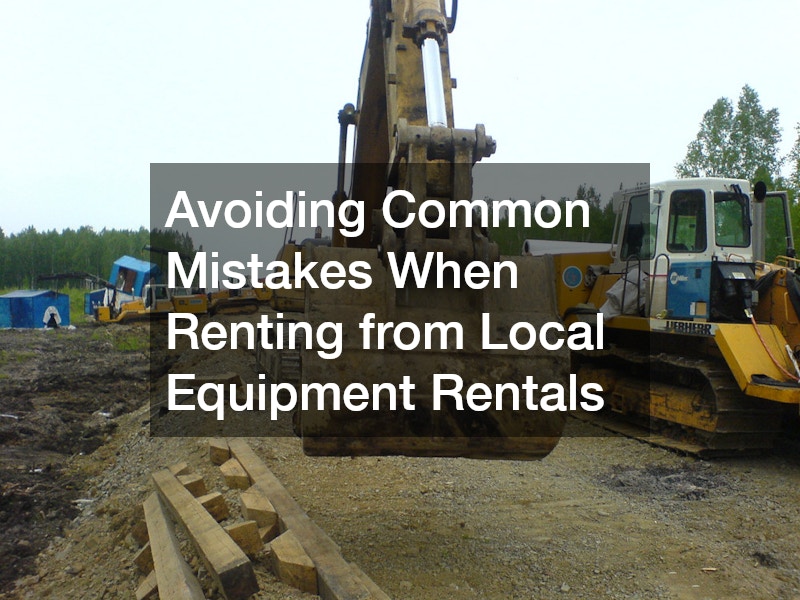Renting equipment from local providers can save time, reduce costs, and support community businesses. However, even experienced professionals sometimes make mistakes that lead to unnecessary delays, unexpected costs, or safety hazards. Understanding common pitfalls and knowing how to avoid them is essential to ensure a smooth rental experience. Whether you are managing a construction project, landscaping, or a special event, a little preparation can go a long way in preventing problems. By planning ahead and asking the right questions, you can maximize efficiency and make the most of your rental experience.
Understanding Your Equipment Needs
One of the most frequent mistakes when renting equipment is failing to assess your actual needs. Many renters select machines or tools based on assumptions rather than specifications, which can result in overpaying for unnecessary features or selecting equipment that is unsuitable for the job.
Start by defining the scope of your project. Make a detailed list of tasks and the types of equipment required to complete them efficiently. For instance, a landscaping project may require different machinery for earthmoving, grading, and compacting. Knowing the exact purpose helps you choose the right size, power, and type of equipment, minimizing downtime and avoiding additional rental fees.
Additionally, consider the skill level required to operate the machinery. Renting equipment that your team cannot safely handle increases the risk of accidents and can lead to damage fees. Many local equipment rentals provide guidance on machine operation, so take advantage of this expertise. Ensuring your team is properly trained not only enhances safety but also improves efficiency and reduces the likelihood of costly mistakes.
Reading the Rental Agreement Carefully
Another common error is overlooking the rental agreement’s details. Rental contracts often include clauses about delivery, return times, fuel policies, and liability for damages. Skipping this step can result in unexpected charges or disputes.
Pay attention to the fine print regarding late returns, cleaning requirements, and maintenance responsibilities. Some local equipment rentals charge per day or even per hour, so missing a deadline can significantly increase costs. Understanding fuel policies is also crucial. Some agreements require returning machines with a full tank, while others bill for fuel used, often at a premium.
Insurance coverage is another critical area. Determine whether your business insurance or the rental company’s insurance will cover accidents, theft, or damage. Not having adequate coverage can leave you financially responsible for costly repairs or replacements.
Inspecting Equipment Before Use
A surprising number of rental issues stem from failing to thoroughly inspect equipment before leaving the rental facility. Machines may appear in good condition at first glance, but hidden problems can affect performance and safety. Even minor issues, if unnoticed, can escalate into costly repairs or project delays once the equipment is in use.
Always conduct a complete inspection. Check for visible damage, leaks, and wear on moving parts. Test the equipment to ensure it starts, functions, and stops correctly. Take photos or videos to document the condition before leaving the rental location—this provides evidence in case the company claims damage upon return.
Additionally, ask the rental staff for a demonstration if you are unfamiliar with the equipment. Proper operation is not only a safety concern but also reduces the likelihood of breakdowns during your project. Small adjustments made before starting work can prevent larger problems later. Taking the time to learn the correct procedures upfront can save hours of troubleshooting and keep your project on schedule.
Communicating With Your Rental Provider
Effective communication is often overlooked but is critical when working with local equipment rentals. Clear communication ensures that both parties understand expectations, timelines, and responsibilities, reducing the chances of misunderstandings.
Discuss project timelines with the rental company to confirm equipment availability and delivery schedules. Local rentals often have limited inventory, so early notice helps guarantee the machinery you need. Clarify any additional charges, such as delivery fees or optional attachments, so you are not surprised when the bill arrives.
Ask questions about best practices for operating the equipment or handling specific tasks. Experienced rental staff often provide tips that can save time and prevent damage. Building a good relationship with your provider can also be beneficial for future rentals, potentially leading to discounts, priority service, or flexible arrangements.
Renting from local equipment rentals offers numerous advantages, including convenience, community support, and often personalized service. However, avoiding common mistakes is key to maximizing these benefits. Assessing your project needs, carefully reading the rental agreement, thoroughly inspecting equipment, and maintaining clear communication can prevent costly errors and ensure a smooth experience.
By taking these steps, you protect your project timeline, reduce expenses, and enhance safety for everyone involved. With proper planning and attention to detail, renting equipment becomes a reliable and efficient solution for a variety of projects, allowing you to focus on achieving high-quality results rather than troubleshooting avoidable problems.


